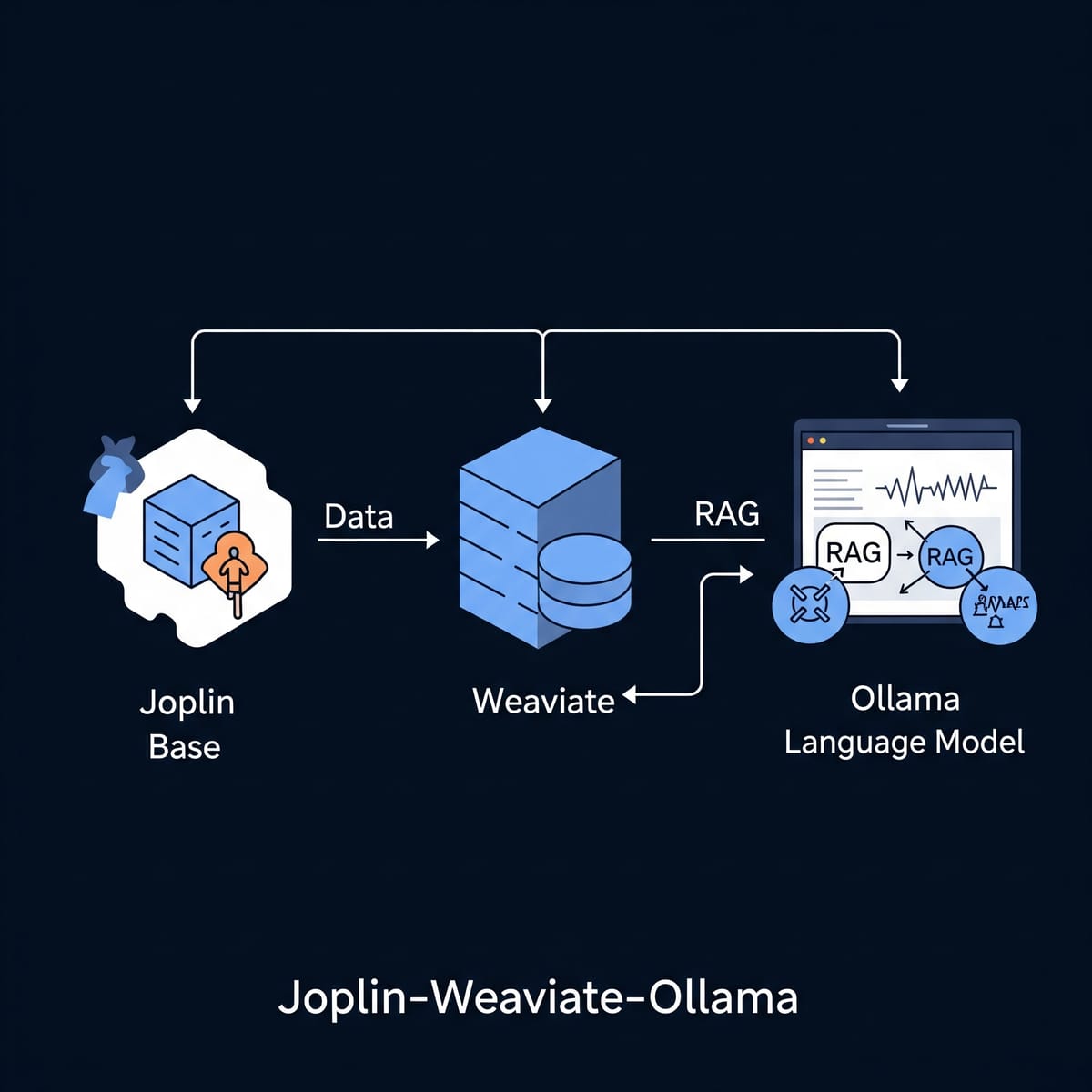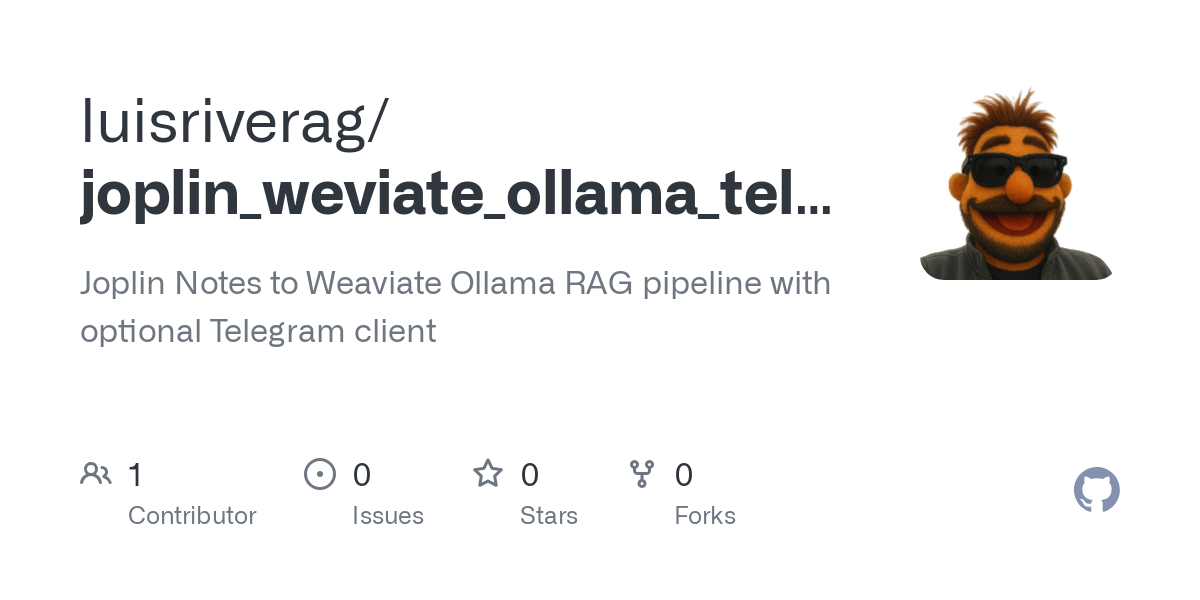Building Your Own Private AI Assistant: A Deep Dive into Joplin-Weaviate-Ollama RAG Pipeline

In an era where privacy concerns are paramount and AI capabilities are becoming essential, finding the sweet spot between powerful AI assistance and data privacy can be challenging. Enter a fascinating open-source project that bridges this gap: the Joplin-Weaviate-Ollama RAG pipeline with Telegram integration.
What is This Project?
This innovative system transforms your personal Joplin notes into a searchable, AI-powered knowledge base that runs entirely on your local infrastructure. By combining several powerful open-source tools, it creates a Retrieval-Augmented Generation (RAG) pipeline that can intelligently answer questions based on your personal notes and documents.
The project ingeniously connects:
- Joplin: Your personal note-taking system
- Weaviate: A vector database for storing embedded content
- Ollama: Local large language model inference
- Telegram: Optional mobile interface for queries
Key Features That Make It Stand Out
Complete Privacy by Design
Unlike cloud-based AI assistants, this system keeps all your data local. Your notes, queries, and responses never leave your infrastructure, ensuring complete privacy and control over your personal information.
Intelligent Content Processing
The system doesn't just store your notes as-is. It processes various file types including:
- Markdown files from your Joplin exports
- PDF documents with text extraction
- Images with OCR (Optical Character Recognition) capabilities
Smart Synchronization
The pipeline includes intelligent sync capabilities that only process changed files, making it efficient for regular updates to your knowledge base.
Dual Interface Options
Whether you prefer command-line interactions or mobile accessibility, the system offers both:
- Console interface for direct local queries
- Telegram bot for remote access (with privacy trade-offs noted)
The Technical Architecture
The RAG Pipeline Explained
The system implements a sophisticated RAG (Retrieval-Augmented Generation) approach:
- Document Ingestion: Your Joplin notes are parsed and processed
- Embedding Generation: Using HuggingFace sentence-transformers, each piece of content is converted into vector embeddings
- Vector Storage: Weaviate stores these embeddings for efficient similarity search
- Query Processing: When you ask a question, the system finds relevant content and uses Ollama to generate contextual responses
Component Breakdown
- joplin_sync.py: Handles the synchronization and upload of your notes
- rag_query.py: Provides the local CLI interface for querying
- telegram_rag_bot.py: Manages the Telegram bot functionality
- Weaviate: Runs in Docker for vector database operations
- Ollama: Provides local LLM inference capabilities
Setting Up Your Personal AI Assistant
The setup process is straightforward but requires several components:
Prerequisites
You'll need to install:
- Python dependencies from the requirements file
- Tesseract OCR for image text extraction
- Ollama for local language model inference
- Docker for running Weaviate
Configuration
The system uses environment variables for configuration, allowing you to:
- Set your Joplin export folder location
- Configure model preferences
- Set up Telegram bot credentials
- Define authorized users for bot access
Real-World Use Cases
Imagine being able to ask questions like:
- "What was that restaurant recommendation from last month's meeting notes?"
- "What's my motorcycle's license plate number?"
- "Show me all my notes about the Python project I worked on last year"
The system can intelligently search through your entire note collection and provide contextual answers based on your personal knowledge base.
Privacy Considerations
The project's creators are transparent about privacy trade-offs:
- Local processing ensures maximum privacy
- The Telegram interface introduces some privacy concerns since messages pass through Telegram's servers
- They recommend using it with exported copies of your notes rather than your original files
Who Should Consider This?
This system is particularly valuable for:
- Privacy-conscious professionals who want AI assistance without cloud dependencies
- Researchers and writers with extensive note collections
- Anyone who wants to unlock the knowledge buried in their personal archives
- Developers interested in building local AI solutions
The Future of Personal AI
This project represents a growing trend toward local AI solutions that prioritize privacy without sacrificing functionality. As large language models become more efficient and accessible, we're likely to see more innovative approaches to personal AI assistants that keep data local while providing powerful capabilities.
The combination of established note-taking workflows (Joplin) with cutting-edge AI technologies (vector databases, local LLMs) creates a compelling solution for those seeking the benefits of AI assistance while maintaining complete control over their data.
Getting Started
For those interested in exploring this system, the project provides comprehensive documentation and setup instructions. The modular design makes it relatively straightforward to adapt for different note-taking systems or add new interfaces beyond the current console and Telegram options.
This project exemplifies how open-source innovation can address real privacy concerns while delivering practical AI capabilities. As we navigate the evolving landscape of AI assistance, solutions like this offer a compelling alternative to cloud-dependent systems, putting users back in control of their data and their AI interactions.
Ready to build your own private AI assistant? Check out the project repository and start transforming your notes into an intelligent, searchable knowledge base that respects your privacy.

Claude 4 Sonnet (20250611). Image from Gemini Flash 2.5 after GPT4o generated "printscreen"
blog post about https://github.com/luisriverag/joplin_weviate_ollama_telegram
